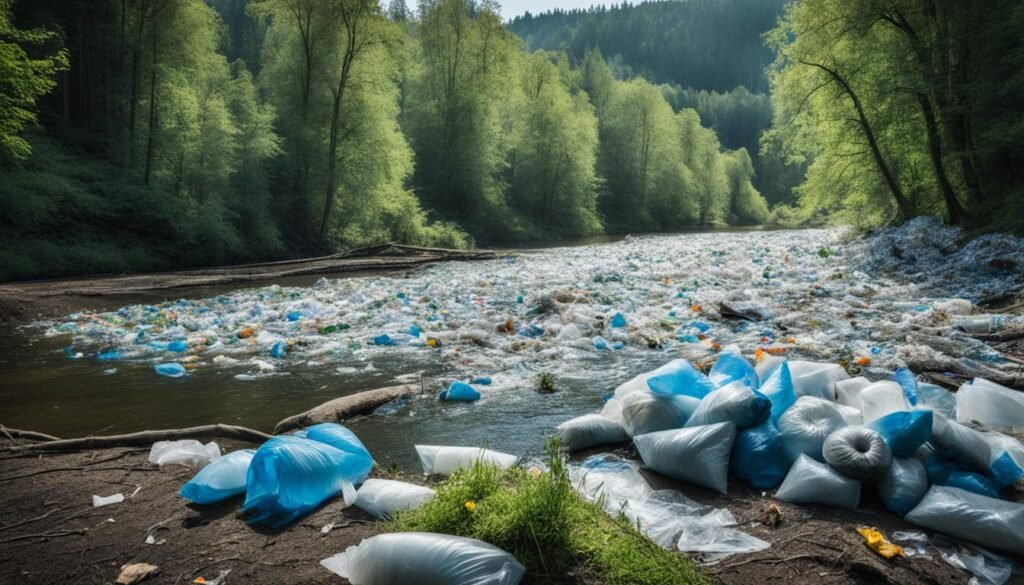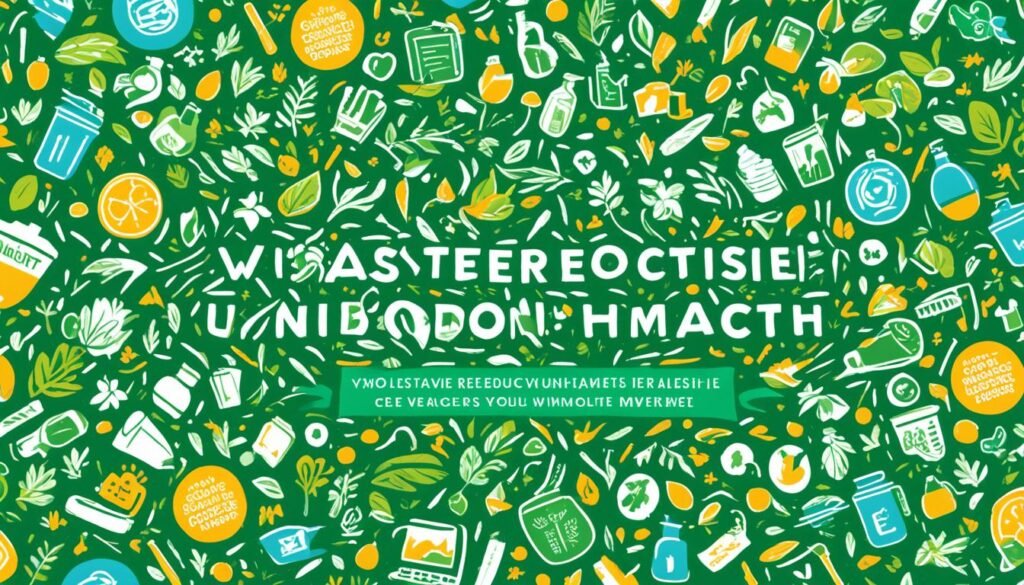Did you know only 9% of the 400 million metric tons of plastic waste is recycled each year? This fact shows how big and urgent the waste problem is. As we keep making waste, pollution damages ecosystems everywhere.
In 2017, the United States made a huge 267.8 million tons of solid waste. Bad waste handling makes climate change worse. This is because landfills create 20% of human-made methane gas. And it’s not just on land.
Ocean creatures and rivers are hurt by waste too. Turtles, whales, seals, and birds often eat microplastics. This is bad for them and us.
Waste doesn’t only harm nature. It’s also a danger to our health. Pollution can cause asthma, birth defects, cancer, and heart disease.
Key Takeaways:
- The vast majority of plastic waste produced globally is not recycled, contributing to the environmental impact of waste.
- The United States alone generates millions of tons of solid waste annually, exacerbating the problem.
- Improper waste disposal practices in landfills contribute significantly to climate change.
- Marine life and waterways suffer from waste pollution, with microplastics endangering various species.
- Human health is at risk due to diseases associated with environmental contamination from waste disposal.
The Impact on Habitats and Wildlife
Waste harms more than just humans; it also damages habitats and wildlife. Poor waste handling can seriously affect ecosystems. This leads to various harmful effects on nature.
Waste pollution changes habitats, upsetting ecosystems’ balance. It can make water areas dark, hurting aquatic plants and animals. Waste can also lower oxygen in water, making it hard for water life to continue.
Bad waste handling changes habitats, affecting their support for water life.
Marine life struggles a lot with waste, especially plastics. Marine debris like plastics is a big danger to many sea creatures. Plastics in water can carry harmful chemicals at much higher levels than the water itself. Animals eating these plastics face serious health risks.
Many marine animals, including sea turtles and fish, suffer from eating plastic. This can lead to less body weight, less fat, and lower chances of having babies. These effects harm the survival and growth of marine populations.
Waste also threatens animals living in these damaged habitats. This includes species at risk of extinction who need healthy homes to survive.
Threats to Wildlife Population and Biodiversity
Waste buildup hurts wildlife populations. Hazardous waste disposal can reduce the number of species and biodiversity loss.
Waste pollution harms all ecosystem levels, from tiny creatures to top predators. It disrupts nature’s connections, leading to imbalances and instability. This affects the whole food chain.
We must recognize and fix waste pollution’s harm to nature. Better waste management, recycling, and reducing waste from the start can protect habitats and biodiversity for the future.

Public Health Implications
Improper waste handling hurts our health. We must cut down the trash we make. By living more sustainably, we better protect our health.
Not cutting waste can make us sick. Being around pollution from trash can cause serious health problems. These include asthma, birth defects, and even cancer.
Waste disposal emissions are bad for the climate. This affects our health and the planet. It creates new health problems and worsens existing ones.
Waste can pollute air, water, and soil. This puts our health at risk. Problems can range from breathing issues to changes in our hormones.
Waste Reduction Strategies for Healthier Communities
To stay healthy, we need to reduce waste. Here are ways to do it:
- Choose sustainable items and reduce packaging.
- Support recycling to keep trash out of dumps.
- Compost to lessen food waste and help soil.
- Teach others about the benefits of reducing waste.
By following these practices, we can fight pollution. This lowers disease risks and makes a cleaner future.
The Role of Waste Disposal Emissions and Health Risks
Trash emissions warm our planet, risking our health. They can cause illnesses from the heat, breathing troubles, and diseases carried by insects.
To cut these emissions, we should:
- Use technology that turns waste to energy with less pollution.
- Make waste treatments use less energy and emit less carbon.
- Explore new, cleaner ways to handle waste.
Protecting Human Health and Promoting Longevity
We all need to work together to stay healthy. Focusing on waste reduction helps protect us. This ensures a healthier life for everyone.

Taking Action for a Sustainable Future
Waste is increasing and it’s harming our ecosystems and health. We need to focus on reducing waste to help our planet. Making less waste and finding sustainable solutions are key steps towards a greener future.
Recycling is a great way to help. It saves resources and creates jobs, boosting the economy. By turning waste into new materials and energy, we use less new resources. This lowers the harm done when we take resources from the Earth.
It’s important to manage all types of waste well, especially tricky ones like electronics and plastics. Treating these materials right stops them from filling landfills or harming nature.
The UNEP International Environmental Technology Centre (IETC) is working to improve how we handle waste. They use pilot projects and work with partners to make waste management better. By focusing on reducing waste, remaking products, and recycling, we can protect our planet. This ensures a safer, sustainable future for everyone.
